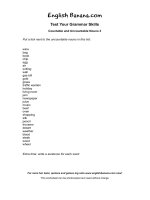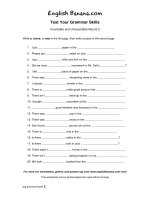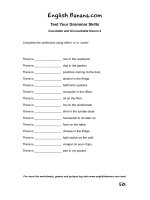9833 countable and uncountable nouns
Bạn đang xem bản rút gọn của tài liệu. Xem và tải ngay bản đầy đủ của tài liệu tại đây (143.99 KB, 7 trang )
(Countable and Uncountable) Nouns
What is the difference between countable and uncountable nouns?
Countable nouns
Countable nouns are individual objects, people, places, etc. which can be counted.
A countable noun can be:
1) singular - a friend, a house, etc.
2) plural - a few apples, lots of trees, etc.
Use the singular form of the verb with a singular countable noun:
•
There is a book on the table. That student is excellent!
Use the plural form of the verb with a countable noun in the plural:
•
There are some students in the classroom. Those houses are very big, aren't they?
Uncountable nouns
Uncountable nouns are materials, concepts, information, etc. which are not individual
objects and cannot be counted.
Uncountable nouns have no plural.
Some common uncountable nouns:
•
•
•
•
•
•
•
•
•
•
•
•
•
•
Accommodation
Advice
Behaviour
Bread
Copper (all metals)
Meat
Sugar
English (all languages)
Furniture
Health
Information
Knowledge
Luggage
Maths
(all
school
subjects)
•
•
•
•
News
Progress
Research
Rice
(all
•
•
•
•
•
•
•
•
•
•
cereals)
Salt (all condiments)
Scenery
Spaghetti
Traffic
Transport
Travel
Trouble
Water (all liquids
Weather
Work
grains
and
Uncountable nouns (especially different types of food) have forms that
express plural concepts. These measurements or containers are
countable:
•
•
water - a glass of water
equipment - a piece of
equipment
•
•
•
•
cheese - a slice of cheese
sugar – one lump of sugar
cake – a slice of cake
toast – a piece of toast
Here are some more common uncountable food types with their
container / quantity expressions:
•
liquids (water, beer, wine, etc.) - a glass, a bottle, a jug of water,
etc.
cheese - a slice, a chunk, a piece of cheese
•
meat - a piece, a slice, a pound of meat
•
Nouns which can be countable or uncountable
Nouns that can be thought of as a single thing/substance (e.g. chicken,
chocolate, egg, hair iron, paper, stone):
•
chocolate: there are two chocolates in the box; you have
chocolate on your face
iron: we have to buy a new iron; vegetables contain lots of iron
•
Hair: there is a hair in my soup; she has blond hair
•
Nouns used to refer to particular varieties (e.g. wine, country)
•
•
wine: would you like some wine?; this is a very good wine
country: I would love to live in the country; he has visited five
different countries
Words for some drinks (e.g. coffee, beer. The countable noun means: a
glass of, a cup of, etc.)
•
coffee: coffee is produced in South America; Fancy a coffee and
a slice of cake?
Time, space, room:
•
•
•
time: there is no time to talk; I didn’t have a very good time at
the party
space: there is no space here; Fill in the spaces with the correct
preposition
room: there is room for seven people in the lift; this is my
favourite room.
Uncountable nouns ending in –s
Some uncountable nouns end in –s and take a singular verb
•
Maths, physics, genetics, athletics, news
Nouns ending in –s that are always plural.
Some nouns are always plural and take a plural verb:
•
Clothes, glasses, jeans, trousers, pliers, scissors
To refer to them as a single item:
•
A pair of: I need a new pair of glasses.
Irregular plural forms
Some nouns have the same form in the singular and plural:
•
•
Aircraft, crossroads, series, sheep, species
Species: There are many different species of dogs; this species
is very rare
Collective nouns
Some nouns can be used with a singular verb if we see them as a unit.
They can also be used with a plural verb if we are talking about
members of the group.
•
•
the army, the family, the government, the media, the press
My family is very small; all my family are coming to the wedding.
NB: these nouns can only take a plural verb: cattle, the people, the
police
Determiners used with (countable
and uncountable) nouns
Lots/a lot of
+ plural countable and
uncountable nouns (informal)
I have lots/a lot of homework.
I have lots/a lot of brothers and
sisters.
Much
+ uncountable nouns
We don’t have much luck.
How much money do you need?
Many
+ plural countable nouns
How many bags do you have?
There are many interesting things to
do.
Little/a
+ uncountable nouns
little/ a bit of
Just a little rice, please – not too
much.
I have a bit of money, but not
enough to pay for that.
The government has done very little
to improve the situation.
Few/a few
+ plural countable nouns
There were quite a few people in the
(some ONLY)
room.
Very few people know the secret.
Some
+ uncountable nouns and
There is some useful information on
plural nouns
that website.
There are some good scenes in that
film.
Hardly any
No/not any
+ uncountable nouns and
There were hardly any customers in
plural countable nouns
the shop.
+ uncountable nouns and
There was no milk left.
plural countable nouns
There were no students on the bus.
There wasn’t any milk left.
There weren’t any students on the
bus.









